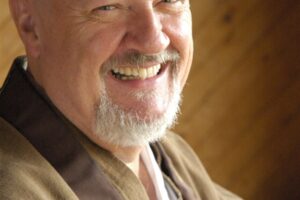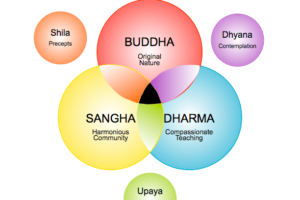
On a recent trip to Virginia, to inaugurate the establishment of our most recent Affiliate Zen group, performing Initiation (Jukai) ceremonies for three members who form the basis of the new community, I had been thinking of Zen as what the world needs now. This recalls the popular song first released in 1965, sung by Jackie DeShannon. The lyrics begin:
What the world needs now is love, sweet love
It’s the only thing that there’s just too little of
What the world needs now is love, sweet love,
No not just for some but for everyone.
As I settled into my room and turned on the television, suddenly this familiar melody began wafting through the room, as if someone was reading my mind. It was a much more recent version, but still had basically the same, somewhat insipid message. Turned out to be the theme this hotel ran throughout their corporate messaging. But this coincidence made me think that maybe I am on to something.
What the world needs now is not love, in my opinion, depending on what we mean by “love.” There are few instances of this term appearing in English translations of Buddhist texts. One that stands out for me is in what is usually referred to as the “Loving Kindness Sutra” or Metta Sutta, attributed to Buddha. Following the stanza which states the overall theme, “May all beings be happy,” it continues:
Let no one deceive another nor despise any being in any state
Let none by anger or hatred wish harm to another
Even as a mother at the risk of her life watches over and protects her only child
So with a boundless mind should one cherish all living things
suffusing love over the entire world above below and all around without limit
So let one cultivate an infinite good will toward the whole world
Well, good luck with that, you might say, though no one would object to the sentiment. It is survival of the fittest, after all; there have to be losers and winners. But the Buddha was not being sentimental. He was simply pointing out the interconnectedness of all beings, on both biological and social levels. But this teaching included all of sentient life within its embrace, not exclusively humanity. This may be the first ecological sermon ever preached (the back story is that so many followers had come together in this area that the trees of the forest were “unhappy”). He was also suggesting that all beings be happy with reality as it is.
Modern science is coming to see the wisdom of this holistic assessment of our actions on the rest of the world, and its reactions to those actions. In despoiling our home, our neighborhood, or the planet, the consequences will return to bite us. It is in our enlightened self-interest to pay attention to the finite nature of this continuum. We all live downwind, or downhill, as someone pointed out. But it is not only America that is contributing to the overall downward slide of our chances of living a better life. China now creates as much pollution from fossil fuels as the US and Europe combined, according to a recent report.
India may want to revisit its cultural heritage. The land that birthed Shakyamuni, Bodhidharma, and a bit later, Gandhi, would not now make the latter happy, according to his grandson, who was interviewed recently on public radio. The turn toward materialism and away from Gandhi’s vision of a compassionate community, as an ideal for government, is recent, and may be irreversible.
Something of the same may be said for China. Watching its rise in recent decades, and listening to the laments and anxiety about the country of Mao becoming the first world power, I felt that the fear-mongers probably did not have the appreciation of one of the world’s oldest cultures that I have developed through study and appreciation of their Zen heritage, which Japan inherited through Master Dogen, and of which we are now the beneficiaries, through Matsuoka Roshi.
Matsuoka Roshi’s efforts in bringing the genuine practice of Zen and its meditation, zazen, to American soil prior to WWII, places our Founder in that rarefied pantheon of the very few — such as Bodhidharma and Master Dogen — who likewise left it all behind to bring the real Zen to a foreign country, from their country of origin; or in Dogen’s case, revitalizing it in their own culture, importing it from a foreign land. In all three cases, it was a mission fraught with personal risk, including physical harm, as well as other forms of danger.
We in the West might feel justified in challenging our counterparts in modern India and China, to live up to their Buddhist legacy, even in shaming them for failing to appreciate the true treasure they have historically, and settling instead for the evanescent inducements of living in a material world. But this would be worse than hypocritical, as the USA now stands as the poster boy to the world for self-centered striving, which, as the Hsinhsinming promises us, ceases, “for the unified mind in accord with the Way.”
This is not a liberal viewpoint. There is nothing liberal about it. It merely seeks to conserve — as in true conservatism — the highest value of community. To which all religious, philosophical and political systems give lip service. Community, or sangha, as one of the Three Treasures of Buddhism — along with buddha (awakening) and dharma (truth or reality) — is one of the triadic value system underpinning Zen, the three pillars on which human society relies for its stability.
There are those who would argue that embracing the larger community, e.g. through too-liberal immigration guidelines, destroys the smaller community — those who are already snugly within its confines. But much evidence is clearly to the contrary.
Biologically, hybrids are more successful in terms of survival than those whose gene pool is too narrow, as in the example of inbred royal families of Europe, to name but one example. Opposites attract — as those familiar with Shopenhauer will recognize — and lead to better outcomes in their progeny, thereby actualizing the will of the species. Sex, the most private and personal of pleasures, in other words, feels good for the sake of future generations, rather than the short-term satisfaction of the present, perceived as our own desires for self-fulfillment, and perverted as objectification of, and power over, others.
So what the world needs now is certainly not that kind of love. Individuals may need it, but the world does not. The species, now at over seven billion and counting, may be able to tolerate a few billion more, but not without a serious reworking of the way wealth is conceived, and distributed.
So what does the world need now? Most people would probably reply with the party line, or the talking points of their particular special interest group. Others would sincerely promote their philosophical or religious point of view. Some may illustrate recommendations from experience from their own personal lives. But in general, each individual would probably have a unique perspective on this issue.
I am no exception to this rule. I would say that what the world needs now is Zen, more Zen. And those who practice Zen in a serious way would know what I mean by that. But those who have not, and do not, practice Zen would have no idea of the difference between that prognosis and any other suggested palliative. The same can be said for Buddhism, which, depending on the source, might mean a variety of different things. Here, from a 1929 tract titled “An Outline of Buddhism” by George W. Wright, quoted on the blog site of James Ford, an American Zen priest, friend and colleague:
Westerners should be attracted to Buddhism because of its striking appeal to reason and common sense, an because it offers a logical and scientific system of ethics and culture that is based on sound philosophical principles.
Other religions have presented excellent moral codes that were well adapted to the conditions that existed at the time they were given out. But there have been vast changes in the world and in the human race since the days of Jesus, for example, and the religious systems have failed to adapt themselves to these changes.
But here, we should be careful. We should remember that Buddha was not a Buddhist, any more than Christ was a Christian. If we were to say that what the world (meaning the followers who were exposed to the teachings of either of these two bodhisattvas) needed then, was Buddhism or Christianity, that would have been a non-starter. There was no Buddhism at that time, and 500 years later, there was no Christianity. So to say so now, would be to point at something that is not really at the heart of the matter. Buddhism and/or Christianity amount to a kind of paper trail, left behind the actual Awakening of Buddha, or the epiphany of Christ.
Same for Zen. It means a variety of things to a variety of people. No two Zen practitioners would have exactly the same definition, as it depends on their own experience, which, by definition, cannot be identical.
So we may say that what the world needs now, is the truth. The Truth is something we accept as pre-existing, though different folks may have different takes on it. In the age of “fake” everything, even the notion that there is a thing called truth is under siege. So we would have to modify, or modulate, our bandying about a term that has been so woefully abused by both sides of the political dialog, as well as many other areas of debate in the public arena.
Others may insist, along the same lines, that what the world needs now is the facts. Just the facts, ma’am. But facts have the same kinds of problems associated with them as “truth” has. Tellingly, this laptop’s on-board dictionary uses a political reference in its first definition of “fact”:
a thing that is indisputably the case: she lacks political experience—a fact that becomes clear when she appears in public | a body of fact.
The “origin” section of the definition is also revealing:
late 15th cent.: from Latin factum, neuter past participle of facere ‘do.’ The original sense was ‘an act or feat,’ later ‘bad deed, a crime,’ surviving in the phrase before (or after) the fact. The earliest of the current senses (‘truth, reality’) dates from the late 16th cent.
Note that originally, it connoted behavior, not a pre-existent condition. This is addressed with characteristic wry humor of one of America’s greatest from the “quote” section of the thesaurus option:
Get your facts first, and then you can distort them as much as you please. Mark Twain, American writer and humorist
This is not really very funny now, in the context of the current shenanigans of our political “leaders.” But it is clarifying, if not comforting, to understand that “the true facts” started out as corrupted by the monkey minds of those professing them.
You may have taken Latin in high school, as I did for a couple of years. There I learned that the verb facio-facere, if memory serves, also means “to make.” So when we say We are not making this up (“Thus have I heard”), we have to have the humility to recognize that, while we solemnly vow to “manifest truth — do not speak falsely,” we cannot speak the absolute truth (though we inadvertently manifest it in our very being); nor can we help but speak falsely, in the sense that we can only offer our version of reality, which cannot be complete, and thus, true. So you might say that the best we can manage is half-truths.
So we have come to the end of this essay, if not the problem it addresses. I would like to close with some comments from my professional background and practice in design, which I find has many parallels with the practice and teachings of Zen Buddhism. One of the links is the focus on problem-solving in both traditions.
When we regard what Buddha experienced, and what he did about it, one of the more reasonable, and less emotionally laden, interpretations is that of problem-solving. Buddha has sometimes been referred to as the first “psychologist,” in that he diagnosed the suffering of the world (including that of people, of course) as caused by our own clinging to attitudes and approaches that basically do not work, in the face of the reality of our situation. He recognized that there is a problem here in paradise — that there is something unsatisfactory (S. dukkha) about it; analyzed his own experience and behavior; and came up with findings, conclusions, and recommendations, based on his in-depth research of the subject, in meditation. He defined the problem thoroughly, which, in design circles, is the essential necessity and method for teasing out a solution to the most seemingly intractable problems.
Most problem-definition we see going on, particularly in the political realm, is tainted by personal self-interest, or bias, and an aversion to admitting to any culpability in the creation of the problems that beset us. One of the fundamental tenets upon which Buddhism and Zen are based is the recognition that I am the source of my problems — not you; not “them.” It may be too much to ask to have a public display of this kind of humility and honesty. But within the privacy of our own meditation, we can afford to face up to the fact that we bear the responsibility for our own existence, though we cannot take full credit for it.
So what the world needs now is definitely this kind of personal comeuppance, as a result of Zen or other self-critical practice. Or simply as merit accumulated from past lives, a well-regarded testament to modesty in action, in the face of good or bad times. Most of us who practice Zen feel that its meditation is the most effective and efficient method for coming to the same conclusions as did Buddha. This is our mission to America and the rest of the world. Simple in principle, difficult in practice. But no one will be convinced of this other than by our example. This is our responsibility. If we manifest the truth of Zen, first by finding verification on the cushion, then actualizing it “with no exertion of the mind’s power” in daily life, this is the most we can do.








